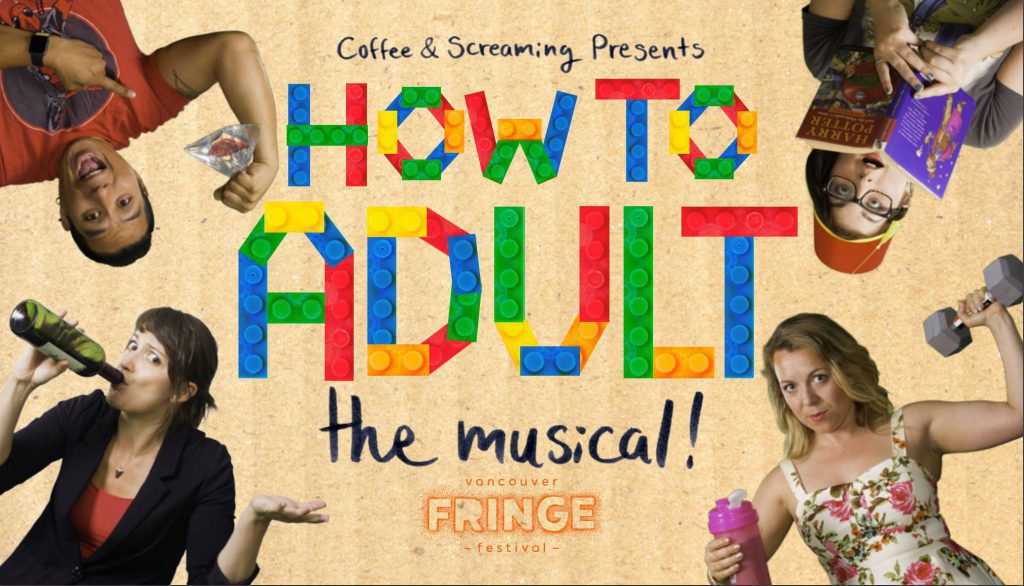How to Adult: The Musical
27 October 2016
By Nathan Marsh
The life of a so-called “millennial” is often misunderstood. For members of older generations, the panoply of digital technologies readily available to the generally tech-savvy young people of today seem to present a much easier way of living than the way they themselves once experienced. However, life in the modern digital age has its complications, a point that playwright Amy Dauer, the writer of How to Adult: The Musical which premiered at the 2016 edition of the Vancouver Fringe Festival, would no doubt be very quick to make.
The Vancouver Fringe Festival is an annual event showcasing the best and brightest talent in local, independent and contemporary theatre, featuring a massive lineup of plays ranging from physical comedies to serious dramas to experimental works–all taking place over a frenetic two week period. I had the opportunity to attend a performance of How to Adult: The Musical, a hilarious theatrical joyride that managed to balance extremely witty satire, which was especially cunning in its critical accuracy of the lifestyle tropes of young people living in Vancouver. It also bent the standards of the musical theatre genre through the utilization of an efficient narrative storytelling that never once felt stale or overly conventional.
How to Adult told the story of three twenty-something year-old women, Holly, Imogen and Rosie, living together in an apartment, each stuck at a different crossroads in their young lives. Each of them carried a contrastingly different personality, with Holly being introduced in sharp business clothes having just lost her job, conversing with boisterous Rosie who had just gone through a separation from her latest boyfriend, and introverted Imogen, who, while this conversation took place between Holly and Rosie, simply sat on the couch, huddled in a blanket, watching Netflix on her laptop, paying no mind to the drama playing out in front of her.
The three women deliberated on their respective struggles with adult life; Holly overexerts herself by being too career-minded and needs a job that will allow her to calm down, Rosie carried anxieties about being single and alone, while Imogen struggled with social anxieties and therefore felt disconnected from her community. The roommates decide to create a list to “adult the fuck up” (as they poignantly sing in a song of the same title), specifically counteracting their respective problems.
The songs written for this piece, all of which very well performed by the actors, were at once hilarious and pugnaciously accurate in their anecdotal portrayal of each of the characters’ problems. The songs served to create intervals in the piece from which the issues that the characters encountered could be summarized and dealt with in a systematic way, thus breaking up the narrative in a pleasingly entertaining fashion.
Following from the creation of the aforementioned “adult the fuck up” list, the drama built up as Rosie met Graham, a top-knotted, sleeveless hoody-wearing, cuffed jeans-adorning, tattooed barista with a strange obsession for Betta fish and a penchant for bragging about traveling to exotic and trendy destinations. This genius bit of prototypical Vancouverite-hipster typecasting matches in with the director’s illustration of each character as a clearly identifiable Vancouver personality. From the perennially yoga-clothed, latte-sipping Rosie, to the career-oriented downtown office-dwelling Holly to the Netflix-obsessed shut-in Imogen, each character embodied a clearly identifiable stereotype within Vancouver culture amongst various factions of young people.
The plot gathered even more steam as the audience discovered that Graham also happened to be Imogen’s brother and Holly’s ex-boyfriend. Rosie developed a crush on Graham, and some easily foreseeable romantic love-triangle/sibling-rivalry drama ensued. The piece concluded with a feel-good ending, wherein each character discovered that they don’t need a list to learn how to be adults, they simply had to be themselves and let life happen as they do the things they love to do.
Though this ending was of course an extremely stereotypical one within narrative storytelling, this is precisely what made How to Adult so interesting. The writer, Dauer, and the director, Eleanor Felton, playfully manipulated the conventions of the genre while keeping its basic structure intact, inserting cleverly unconventional character scripting, foul-mouthed ranting songs and bitingly accurate portrayals of life as a city-dwelling young person, all the while playfully poking fun at the ways in which young people choose to identify themselves in a very Vancouver-centric way. The concoction of the old and the new, the stereotypical and the unconventional, made How to Adult: The Musical a refreshing and thoroughly enjoyable experience.



